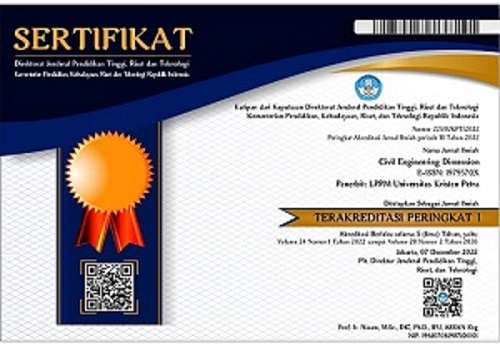Assessing Risk Management Capability of Public Sector Organizations Related to PPP Scheme Development for Water Supply in Indonesia
 :
:
https://doi.org/10.9744/ced.14.1.26-35
Keywords:
Public private partnership, concession scheme, water supply, risk management, maturity model, public sector organization.Abstract
The success of Public Private Partnership (PPP) for water supply investment is inseparable from the capability of risk management of the parties within the project. This study investigates the risk management capability of Indonesian local public sector organizations that are potentially involved in PPP schemes for water supply. A risk management maturity model based assessment tool probing the culture, process, experience, application and partnership aspects is used in the survey. The model describes risk management capability in four levels (ad-hoc, initial, competent, excellent). The survey shows that their risk management capability is still in-average at the initial stage (level 2), meaning that the adopted risk management postures are mostly supported only by unstructured, ad-hoc and non-formal processes. The result of this study can help decision makers in choosing appropriate risk management methods and tools to be used by the local public authorities for managing risks in PPP schemes.References
Pribadi, K,S., Soekirno, P., and Pangeran, M.H., Integrating Qualitative and Quantitative Risk Analysis for Investment in Public-Private Part¬ner-ship Scheme for Water Supply in Indonesia, Proceedings of the Tenth East Asia-Pacific Conference on Structural Engineering and Construction, Bangkok, 2006, pp. 201-208.
Haarmeyer, D. and Mody, A., Financing Water and Sanitation Projects–The Unique Risks, World Bank Public Policy for the Private Sector, Note No. 151, 1998.
Dailami, M. and Leipziger, D., Infrastructure Project Finance and Capital Flows: A New Perspective, World Development, 26 (7), 1998, pp. 1283-1298.
Dixon, T., Pottinger, G., and Jordan, A., Lessons From the Private Finance Initiative in the UK–Benefits, Problems and Critical Success Factors', Journal of Property Investment and Finance, 23 (5), 2005, pp. 412-423.
Li, B., Akintoye, A., Edwards, P.J. and Hardcastle, C., Critical Success Factors for PPP/PFI Projects in the UK Construction Industry, Construction Management and Economics, 23 (5), 2005, pp. 459- 471.
Australian Government Department of Finance and Administration, Public Private Partnerships: Risk Management, Commonwealth of Australia, 2006.
Akintoye, A., Fitzgerald, E. and Hardcastle, C., Risk Management for Local Authorities’ Private Finance Initiative Projects, Glasgow Caledonian University, 1999.
Akerele, D and Gidado, K., The Risks and Constraints in the Implementation of PFI/PPP in Nigeria, Proceedings of 19th Annual ARCOM Conference, Vol 1, 2003, pp. 379-391.
Ng, A. and Loosemore, M., Risk Allocation in the Private Provision of Public Infrastructure, International Journal of Project Management, 25, 2006, pp. 66-76.
INCOSE Risk Management Working Group, PMI Risk Management Specific Interest Group and UK APM Risk Specific Interest Group, Risk Management Maturity Level Development, Risk Management Research and Development Program Collaboration, 2002.
Presidential Regulation of Republic of Indonesia No. 67 year 2005 on The Cooperation between the Government and the Business Entities in the Provision of Infrastructure.
Pangeran, M.H., Pribadi, K.S. and Wirahadi-kusumah, R.D., Kerjasama Pemerintah dan Swasta Dalam Pengelolaan Infrastruktur: Usulan Model Untuk Mengukur Kematangan Manajemen Risiko Para Pihak yang Terkait, Prosiding Seminar Nasional Teknik Sipil VI, Surabaya, 2010, pp. C.187-197.
Khalfan, M.M.A., Anumba, C.J. and Carrillo, P.M., Development of a Readiness Assessment Model for Concurrent Engineering in Construction, Benchmarking: An International Journal, 8 (3), 2001, pp. 223-239.
Bourne, L.M., SRMM: Stakeholder Relationship Management Maturity, Proceeding of PMI Global Congress, St. Julians, Malta, 2008.
Bay, A.F., Skittmore, M., and Susilawati, C., Tingkat Kematangan Manajemen Proyek: Survei Di Beberapa Tempat Di Indonesia, Dimensi Teknik Sipil, 7(2), pp. 81-89.
Hillson, D., Towards a Risk Maturity Model, International Journal of Project and Business Risk Management, 1(1), 1997, pp. 35-45
Hillson, D., Assessing Organizational Project Management Capability, Journal of Facilities Management, 2(3), 2003, pp. 298-311.
Badan Pendukung Pengembangan Sistem Penyediaan Air Minum (BPPSPAM), Indonesia Water Supply Infrastructure PPP Investment Opportunities, Kementerian Pekerjaan Umum, Jakarta, 2010.
Q. Zhang, Criteria for Selecting the Private-Sector Partner in Public-Private Partnerships, Journal of Construction Engineering and Management, 131(6), 2005, pp. 631-644.
George, D. and Mallery, P., SPSS for Windows step by step–A Simple Guide and Reference 9.0 Update, 2nd Edition, Allyn and Bacon, Boston, 2000.
Downloads
Published
How to Cite
Issue
Section
License
Authors who publish with this journal agree to the following terms:- Authors retain the copyright and publishing right, and grant the journal right of first publication with the work simultaneously licensed under a Creative Commons Attribution License that allows others to share the work with an acknowledgement of the work's authorship and initial publication in this journal.
- Authors are able to enter into separate, additional contractual arrangements for the non-exclusive distribution of the journal's published version of the work (e.g., post it to an institutional repository or publish it in a book), with an acknowledgement of its initial publication in this journal.
- Authors are permitted and encouraged to post their work online (e.g., in institutional repositories or on their website) followingthe publication of the article, as it can lead to productive exchanges, as well as earlier and greater citation of published work (See The Effect of Open Access).
















